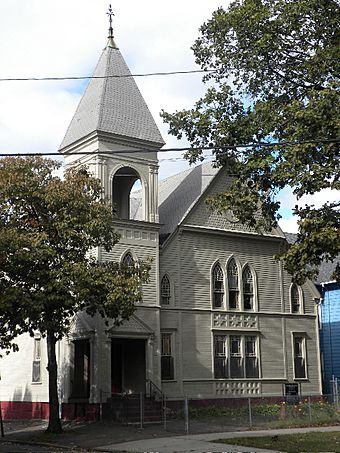Howard Avenue Historic District facts for kids
Quick facts for kids |
|
|
Howard Avenue Historic District
|
|

Howard Avenue Methodist Church, now New Light Holy Church (1875-1890), 198 Howard Ave., Luzerne I. Thomas, architect.
|
|
| Location | Properties along Howard Ave. between I-95 and Washington Ave., New Haven, Connecticut |
|---|---|
| Area | 32 acres (13 ha) |
| Built | 1880 |
| Architect | Multiple |
| Architectural style | Colonial Revival, Late Victorian, Queen Anne |
| NRHP reference No. | 85002308 |
| Added to NRHP | September 12, 1985 |
The Howard Avenue Historic District is a special area in New Haven, Connecticut. It covers about 32-acre (13 ha) in the The Hill neighborhood. This district is important because it has many old buildings from the late 1800s.
These buildings show how people lived and built homes back then. The district was added to the National Register of Historic Places in 1985. This means it's a place worth protecting for its history.
Contents
Exploring the Howard Avenue Historic District
The Howard Avenue Historic District stretches along Howard Avenue. It goes from Minor Street all the way to I-95. This area is like a time capsule. It shows what a middle-class neighborhood looked like over a hundred years ago.
You can see many homes built in the late 19th century. They are mostly wooden houses. There are also a few brick buildings. You might even spot an old school or firehouse.
A Look Back in Time
Howard Avenue was first planned way back in the 1640s. For a long time, it was mostly surrounded by farms. In the early 1800s, someone tried to make it a fancy street for homes. But it didn't work out at first.
Things changed in the 1860s. A horse-drawn railway started running along the northern part of the street. This made it easier for people to get around. Soon, a big railyard was built nearby. Many workers came to live in the area because of the railway jobs.
What You'll See Today
When the district was listed in 1985, it had 151 important buildings. Most of these are homes. They show different building styles from the 1860s to the 1910s. These homes are often simple but charming.
They haven't been changed much over the years. This helps us see how the neighborhood grew. It's a great place to learn about the past.
Gallery
 | Percy Lavon Julian |
 | Katherine Johnson |
 | George Washington Carver |
 | Annie Easley |







